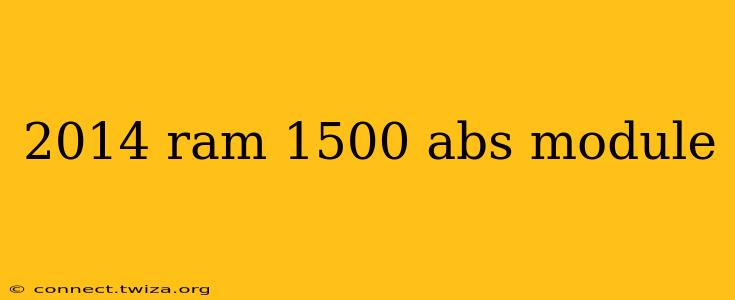The Anti-lock Braking System (ABS) is a crucial safety feature in your 2014 Ram 1500. A malfunctioning ABS module can lead to a variety of problems, from warning lights illuminating on your dashboard to complete ABS failure. Understanding the symptoms, troubleshooting steps, and potential replacement options is essential for maintaining your vehicle's safety and performance. This guide will walk you through everything you need to know about your 2014 Ram 1500's ABS module.
What Does the ABS Module Do?
The ABS module is the "brains" of your anti-lock braking system. It's a sophisticated electronic control unit (ECU) responsible for monitoring wheel speed sensors and controlling the hydraulic system to prevent wheel lockup during braking. This prevents skidding and allows for better steering control in emergency situations. A faulty ABS module can compromise these critical safety functions.
Symptoms of a Failing 2014 Ram 1500 ABS Module
Several symptoms can indicate a problem with your ABS module. These can range from minor inconveniences to serious safety concerns. Recognizing these signs early is crucial:
- ABS Warning Light: The most common symptom is the illumination of the ABS warning light on your dashboard. This light indicates a malfunction within the ABS system.
- Brake Warning Light: Sometimes, the brake warning light will also illuminate alongside or instead of the ABS light, suggesting a more widespread brake system issue potentially linked to the ABS module.
- ABS Inoperative: In some cases, the ABS system may completely fail, meaning your wheels could lock up during hard braking. This significantly increases the risk of an accident.
- Erratic ABS Operation: You might experience inconsistent or erratic ABS engagement, leading to a jarring or unpredictable braking experience.
- Traction Control Issues: Since the ABS module works in conjunction with the traction control system, malfunctions can affect traction control functionality.
- Diagnostic Trouble Codes (DTCs): A professional mechanic can use an OBD-II scanner to read diagnostic trouble codes stored within your vehicle's computer. These codes can pinpoint specific problems within the ABS system.
How Much Does a 2014 Ram 1500 ABS Module Replacement Cost?
The cost of replacing a 2014 Ram 1500 ABS module can vary significantly depending on several factors:
- Part Cost: The price of a new or remanufactured ABS module can range widely, influenced by the supplier and whether you opt for a genuine Mopar part or an aftermarket alternative.
- Labor Costs: The labor involved in replacing the module can be substantial, as it often requires specialized knowledge and tools.
- Diagnostic Fees: The cost of diagnosing the problem accurately can add to the overall expense.
Getting multiple quotes from reputable repair shops is highly recommended to obtain the best price.
Can I Replace the 2014 Ram 1500 ABS Module Myself?
While technically possible, replacing the ABS module yourself is generally not recommended unless you have extensive automotive electrical and mechanical experience. The process involves working with sensitive electronic components and requires specialized tools and diagnostic equipment. Incorrect installation can lead to further damage or safety hazards. It's best to leave this job to a qualified mechanic.
How to Troubleshoot a 2014 Ram 1500 ABS Module Problem
Before rushing to replace the ABS module, it's essential to perform some basic troubleshooting steps:
- Check the Fuses: Ensure that all fuses related to the ABS system are intact and functioning correctly.
- Inspect Wiring and Connectors: Examine the wiring harness and connectors associated with the ABS module, looking for any signs of damage, corrosion, or loose connections.
- Check Wheel Speed Sensors: Faulty wheel speed sensors can sometimes trigger ABS module error codes. Inspect these sensors for damage or debris.
What Causes a 2014 Ram 1500 ABS Module to Fail?
Several factors can contribute to ABS module failure:
- Electrical Issues: Voltage spikes, short circuits, or corrosion in the wiring harness can damage the sensitive electronics within the module.
- Water Damage: Exposure to water or moisture can cause internal damage and corrosion within the ABS module.
- Physical Damage: Impact or vibration can also cause physical damage to the module, leading to malfunctions.
- Manufacturing Defects: Although rare, manufacturing defects can sometimes lead to premature module failure.
- Software Glitches: While less common, software glitches within the module's programming can sometimes cause issues.
Remember, this information is for guidance only. Always consult a qualified mechanic for diagnosis and repair of your vehicle's ABS system. Safety should always be your top priority.
